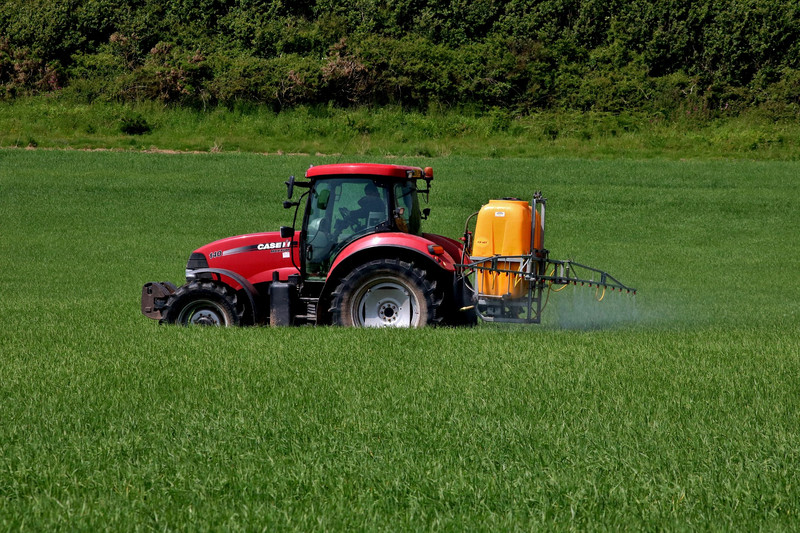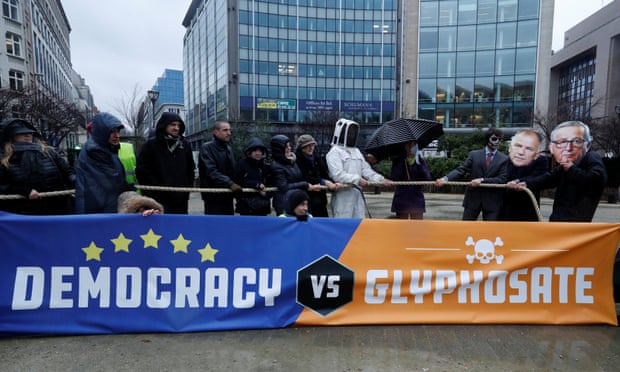Најтазе пример за тоа како функционираат евробирократите во Брисел, е неодамнешната одлука на неизбраните комесари од Европската Комисија со која му дадоа нова лиценца на Монсанто за да го продава својот хербицид Раундап во државите членки на ЕУ.
Хербицидот Раундап на Монсанто содржи глифосат, кој е прогласен од страна на Светската Здравствена Организација за канцероген, но парите се помили од здравјето за неизбраните комесари од Европската Комисија, кои со мнозинство од 18 гласа ЗА, наспроти 9 ПРОТИВ и 1 ВОЗДРЖАН, му дозволија на Монсанто да продолжи да го продава својот отров во државите членки на ЕУ и да го труе европското земјоделско земјиште и во наредните 5 години.
И сосема неизненадувачки, одлучувачкиот глас го имаа Ангела Меркел и нејзините евробирократски миленици.
https://euobserver.com/environment/140042
German vote swings EU decision on 5-year glyphosate renewal
27. Nov 2017, 19:00
By Caterina Tani
 Eighteen countries agreed to use the weedkiller for five more years in Europe. (Photo: Pixabay)
Eighteen countries agreed to use the weedkiller for five more years in Europe. (Photo: Pixabay)
EU member states agreed on Monday (27 November) on a five-year renewal period for the controversial herbicide glyphosate, used by Monsanto in its Roundup product.
The decision was taken by EU member states' experts, with 18 votes in favour, nine against and one abstention.
Germany's vote in favour of the proposal helped to reach a vote representing 65.71 percent of the EU population, just above the 65 percent threshold needed under the qualified majority rule.
The nine countries that opposed the five-year renewal were Belgium, Greece, France, Croatia, Italy, Cyprus, Luxembourg, Malta, and Austria.
Portugal was the state that abstained. In a previous vote on 9 November, four states had abstained.
The European Commission has now the green light for a a formal renewal of the licence for glyphosate in the EU.
"Today's vote shows that when we all want to, we are able to share and accept our collective responsibility in decision making," said health commissioner Vytenis Andriukaitis.
Germany's decision to support the renewal created waves in Berlin with the outgoing coalition government.
The environment minister, Social Democrat Barbara Hendricks, said she had called her agriculture colleague, the Christian Democrat Christian Schmidt, in the morning to tell him that she "still did not agree" with the renewal.
"You cannot behave like this when you try to build trust," she said after the Brussels vote, referring to the talks that are due to start soon to form a new coalition between the CDU and Christian Social Union, with the SPD.
Scandal
"This is a scandal," said Green MEP Sven Giegold.
He said that the German government decision to support the renewal was as a "slap in the face of the environment and consumers."
Until last Sunday, the German Greens were in talks to form a government with the CDU of chancellor Angela Merkel, plus the CSU and pro-business FDP.
Other politicians in Europe were also critical of the member states' decision.
"This is not a clear signal for a phase-out of glyphosate. The fight needs to go on" said Luxembourgish health minister Carole Dieschbourg, whose country voted against.
In France, president Emmanuel Macron said that he would put a ban on glyphosate "as soon as alternatives have been found, or within three years at the latest."
In a statement, French and Belgian social democrat MEPs Eric Andrieu and Marc Tarabella said that "the 28 and the European Commission are guilty of failure to assist persons in danger."
"The European Commission has to stop the 'ostrich' policy," they said.
Julie Girling, from the conservative ECR group in the European Parliament, said she was really "pleased" for the re-authorisation of the herbicide,
"This represents the triumph of common sense in the face of a relentless campaign from some green groups determined to ignore scientific evidence and worry the public unnecessarily," she said in a statement.
Several hours after the decision was taken, a handful of left-leaning MEPs expressed their anger at a meeting of the environmental and food safety committee.
"We didn't ask for renewal, we asked for a phase-out," said Czech centre-left MEP Pavel Poc.
In a resolution adopted in the parliament's plenary in October, the parliament asked for a phase-out over the next five years.
Poc said seeing this resolution as an endorsement of a five-year renewal was a "misinterpretation" of the EP resolution.
He reacted angrily to the comments from his centre-right colleague Pilar Ayuso, a Spanish member of the European People's Party (EPP).
Ayuso had said that the renewal of glyphosate debate had been accompanied by "falsehoods", which she called "stupid."
"We've debated glyphosate quite enough," said Ayuso.
The committee will vote on an objection to the decision on Tuesday (28 November).
NGOs and environmental protection associations unanimously condemned member states' decision.
"Five more years of glyphosate will put our health and environment at risk, and is a major setback to more sustainable farming methods," Adrian Bebb from Friends of the Earth Europe warned.
The Commission and most governments have chosen "to ignore the warnings of independent scientists, the demands of the European Parliament and the petition" calling for a glyphosate ban, Greenpeace EU food policy director Franziska Achterberg commented.
Some 1.3 million Europeans citizens presented a petition asking the European Union to ban glyphosate, with the petition discussed on 20 November at the parliament.
Even though two EU agencies have said glyphosate is safe, some NGO and environmental activists strongly object, as the World Health Organisation's International Agency for Research on Cancer has classified glyphosate as "probably carcinogenic to humans".
Monsanto itself also expressed frustration at the renewal. "Glyphosate has fulfilled all requirements for a full 15-year renewal," the company said on Twitter.
"There is no scientific basis for approving authorisation for only five years."
https://www.theguardian.com/environment/2017/nov/27/controversial-glyphosate-weedkiller-wins-new-five-year-lease-in-europe
Controversial glyphosate weedkiller wins new five-year lease in Europe
Monday 27 November 2017 17.42 GMT
Arthur Neslen
EU votes to reauthorise the pesticide, ending a bitterly fought battle that saw 1.3 million people sign a petition calling for a ban
 Protestors wearing masks depicting EU health commissioner Vytenis Andriukaitis (L) and European Commission president Jean Claude Juncker (R) demonstrate against a five-year extension of the license for glyphosate in Brussels on Monday. Photograph: Yves Herman/Reuters
Protestors wearing masks depicting EU health commissioner Vytenis Andriukaitis (L) and European Commission president Jean Claude Juncker (R) demonstrate against a five-year extension of the license for glyphosate in Brussels on Monday. Photograph: Yves Herman/Reuters
Glyphosate, the key ingredient in the world’s bestselling weedkiller, has won a new five-year lease in
Europe, closing the most bitterly fought pesticide relicensing battle of recent times.
The herbicide’s licence had been due to run out in less than three weeks, raising the prospect of Monsanto’s Roundup disappearing from store shelves and, potentially,
a farmers’ revolt.
Instead, an EU appeal committee voted on Monday to reauthorise the substance despite
a petition by 1.3 million EU citizens last week calling for a ban.
In 2015, the World Health Organisation’s cancer agency, the IARC, famously declared glyphosate “probably carcinogenic to humans,” although
several international agencies, including Efsa, subsequently came to opposite conclusions. Monsanto insists glyphosate is safe.
The EU health commissioner Vytenis Andriukaitis said: “Today’s vote shows that when we all want to, we are able to share and accept our collective responsibility in decision making.”
However, the approval falls far short of the 15-year licence the commission had originally sought and Conservative MEPs lashed out at what they called “an emotional, irrational but politically convenient fudge”.
Ashley Fox, the Conservative party’s delegation leader in the European parliament, said that the vote “simply prolongs the uncertainty for our farmers, who are being badly let down. They cannot plan for the future without long term assurances about the availability of substances they rely on.”
A re-run of the struggle to reauthorise glyphosate will now begin again in two years’ time, with a new safety assessment by the European
Food Safety Authority (Efsa).
Greenpeace EU food policy director, Franziska Achterberg, commented: “The people who are supposed to protect us from dangerous pesticides have failed to do their jobs and betrayed the trust Europeans place in them.”
The Green party called it “a dark day for consumers, farmers and the environment”.
Chris Portier, an advisor to IARC in its glyphosate decision, told the Guardian that, in his view, the EU decision was scientifically unsound.
“The guidelines maintained by ECHA [the European chemical agency] would easily classify this compound as a group 1B carcinogen and, as such, it should be banned for use in Europe,” he said.
The row over glyphosate has raised questions over
modern farming techniques,
regulatory capture and
scientific independence, as well as
the safety of ubiquitous pesticides.
Traces of glyphosate are routinely found in tests of foodstuffs, water, topsoil, and human urine in amounts way above safe limits set by regulators. Ben & Jerry’s recently introduced
a new line of organic ice cream, in a bid to sate public concern.
Campaigners say Monsanto ghostwrote research papers for regulators, enlisted EPA officials to block a US government review of glyphosate and formed front groups to discredit critical scientists and journalists, citing documents revealed in a US lawsuit by non-Hodgkin’s lymphoma sufferers.
More than 280 similar lawsuits are now pending against Monsanto,
according to the US right to know campaign.
But the enzyme-blocking chemical has also become a mainstay of modern agricultural techniques that farmers’ unions see as environmentally friendly, even as critics condemn it as a
“pesticide treadmill” of danger to plants, animals and people.
Monsanto argues that, as a no-till system, glyphosate lowers carbon emissions and protects soil quality. The company declined to comment on today’s result, deferring to farmers’ groups.
Guy Smith, vice-president of the National Farmers Union, said: “Today’s decision will be welcomed by farmers who have watched with growing concern as what should have been a straightforward decision has become increasingly political.”
“Glyphosate reduces the need to use other herbicides, it helps to protect soil and cut greenhouse gas emissions by reducing the need for ploughing, and it enables farmers in this country to grow crops that help produce safe, affordable, high-quality British food.”






 силуваат швеѓанки
силуваат швеѓанкисилуваат швеѓанки


 Цар
Цар 
